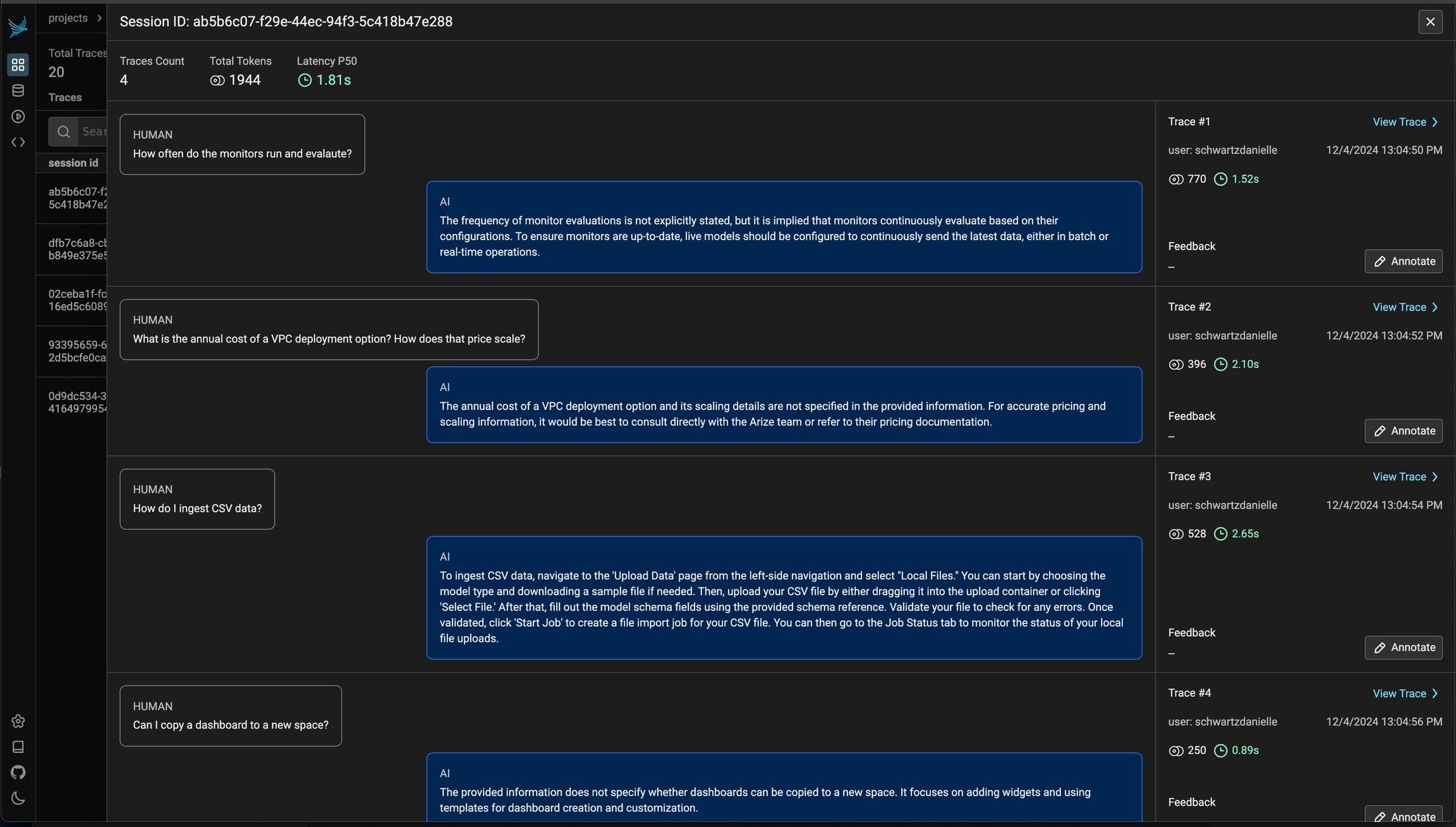
How to track sessions across multiple traces
Sessions UI is available in Phoenix 7.0 and requires a db migration if you're coming from an older version of Phoenix.
A Session is a sequence of traces representing a single session (e.g. a session or a thread). Each response is represented as its own trace, but these traces are linked together by being part of the same session.
To associate traces together, you need to pass in a special metadata key where the value is the unique identifier for that thread.
OpenAI tracing with Sessions
Python
LlamaIndex tracing with Sessions
Python
OpenAI tracing with Sessions
TS/JS
Below is an example of logging conversations:
First make sure you have the required dependancies installed
pip install openinference-instrumentationBelow is an example of how to use openinference.instrumentation to the traces created.
import uuid
import openai
from openinference.instrumentation import using_session
from openinference.semconv.trace import SpanAttributes
from opentelemetry import trace
client = openai.Client()
session_id = str(uuid.uuid4())
tracer = trace.get_tracer(__name__)
@tracer.start_as_current_span(name="agent", attributes={SpanAttributes.OPENINFERENCE_SPAN_KIND: "agent"})
def assistant(
messages: list[dict],
session_id: str = str,
):
current_span = trace.get_current_span()
current_span.set_attribute(SpanAttributes.SESSION_ID, session_id)
current_span.set_attribute(SpanAttributes.INPUT_VALUE, messages[-1].get('content'))
# Propagate the session_id down to spans crated by the OpenAI instrumentation
# This is not strictly necessary, but it helps to correlate the spans to the same session
with using_session(session_id):
response = client.chat.completions.create(
model="gpt-3.5-turbo",
messages=[{"role": "system", "content": "You are a helpful assistant."}] + messages,
).choices[0].message
current_span.set_attribute(SpanAttributes.OUTPUT_VALUE, response.content)
return response
messages = [
{"role": "user", "content": "hi! im bob"}
]
response = assistant(
messages,
session_id=session_id,
)
messages = messages + [
response,
{"role": "user", "content": "what's my name?"}
]
response = assistant(
messages,
session_id=session_id,
)The easiest way to add sessions to your application is to install @arizeai/openinfernce-core
npm install @arizeai/openinference-core --saveYou now can use either the session.id semantic attribute or the setSession utility function from openinference-core to associate traces with a particular session:
import { trace } from "@opentelemetry/api";
import { SemanticConventions } from "@arizeai/openinference-semantic-conventions";
import { context } from "@opentelemetry/api";
import { setSession } from "@arizeai/openinference-core";
const tracer = trace.getTracer("agent");
const client = new OpenAI({
apiKey: process.env["OPENAI_API_KEY"], // This is the default and can be omitted
});
async function assistant(params: {
messages: { role: string; content: string }[];
sessionId: string;
}) {
return tracer.startActiveSpan("agent", async (span: Span) => {
span.setAttribute(SemanticConventions.OPENINFERENCE_SPAN_KIND, "agent");
span.setAttribute(SemanticConventions.SESSION_ID, params.sessionId);
span.setAttribute(
SemanticConventions.INPUT_VALUE,
messages[messages.length - 1].content,
);
try {
// This is not strictly necessary but it helps propagate the session ID
// to all child spans
return context.with(
setSession(context.active(), { sessionId: params.sessionId }),
async () => {
// Calls within this block will generate spans with the session ID set
const chatCompletion = await client.chat.completions.create({
messages: params.messages,
model: "gpt-3.5-turbo",
});
const response = chatCompletion.choices[0].message;
span.setAttribute(SemanticConventions.OUTPUT_VALUE, response.content);
span.end();
return response;
},
);
} catch (e) {
span.error(e);
}
});
}
const sessionId = crypto.randomUUID();
let messages = [{ role: "user", content: "hi! im Tim" }];
const res = await assistant({
messages,
sessionId: sessionId,
});
messages = [res, { role: "assistant", content: "What is my name?" }];
await assistant({
messages,
sessionId: sessionId,
});You can view the sessions for a given project by clicking on the "Sessions" tab in the project. You will see a list of all the recent sessions as well as some analytics. You can search the content of the messages to narrow down the list.
You can then click into a given session. This will open the history of a particular session. If the sessions contain input / output, you will see a chatbot-like UI where you can see the a history of inputs and outputs.
For LangChain, in order to log runs as part of the same thread you need to pass a special metadata key to the run. The key value is the unique identifier for that conversation. The key name should be one of:
session_id
thread_id
conversation_id.

